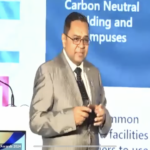Shaping Climate Responsive Futures

Global leaders emphasise the importance of tailored, equitable actions to combat climate change and pave the way for a sustainable and resilient future, highlighting the immediate and large-scale reductions in greenhouse gas emissions
Global warming, driven by anthropogenic activities, has reached concerning levels, with the global surface temperature surpassing 1.1°C above pre-industrial levels in recent years, according to the Intergovernmental Panel on Climate Change (IPCC). Immediate and large-scale reductions in greenhouse gas emissions are imperative to limit warming to 1.5°C, a threshold beyond which climate hazards become unavoidable. The urgency of this task is underscored by projections indicating that global greenhouse gas emissions are expected to peak between 2020 and 2025. These projections emphasise the critical nature of the current decade for climate action.
Equity considerations play a crucial role in shaping climate-responsive futures, particularly concerning mitigation, adaptation, loss & damage and means of implementation. Disparities in emissions and vulnerabilities among countries necessitate tailored approaches rather than one-size-fits-all solutions. Climate change poses a significant barrier to achieving the Sustainable Development Goals (SDGs), highlighting the need for urgent and concerted action, especially for vulnerable communities.
Building on the momentum from previous COP meetings, nations are doubling down on their commitments to combat climate change. Mukhtar Babayev, Minister of Ecology and Natural Resources of the Republic of Azerbaijan, emphasised “The need for concrete actions to triple renewable energy capacity and double energy efficiency is important. The significance of securing strong commitments from nations and stakeholders to translate ambitious targets brings tangible results.” He also highlighted the necessity of prioritising quantifiable targets and indicators to ensure real progress, particularly in doubling adaptation finance by 2025.
Jennifer Morgan, State Secretary and Special Envoy for International Climate Action at the Federal Foreign Office of Germany reiterated the importance of shifting towards sustainable growth and investment plans. Germany, along with the EU, aims to reduce emissions substantially by 2040, signalling a commitment to invest in a climate-responsive future. Morgan emphasised the need to shift away from viewing climate action as separate from economic goals and instead capitalise on the opportunities presented by climate-friendly technologies and industries.
Hoesung Lee, Former Chair of the IPCC, echoed the sentiment that transitioning away from fossil fuels is imperative to address climate change effectively. Lee emphasised the need for a just and orderly approach to cope with the impacts of climate change, especially in vulnerable regions. “Despite the challenges, studies suggest that closing existing gaps in climate action could lead to significant economic benefits. However, there remains a disconnect between global aspirations for limiting warming and individual choices, highlighting the need for innovative policies and leadership to drive change,” he said.
The urgency of addressing climate change has never been clearer. The decisions made in this crucial decade will shape the future of our planet and determine the well-being of future generations. While the challenges ahead are daunting, the collective resolve to build a sustainable and resilient future remains strong. Nations must come together, foster cooperation and take decisive action to mitigate the impacts of climate change and secure a better future for all.






































































































































































































































































































































































































































































































































































































































































































































































































































